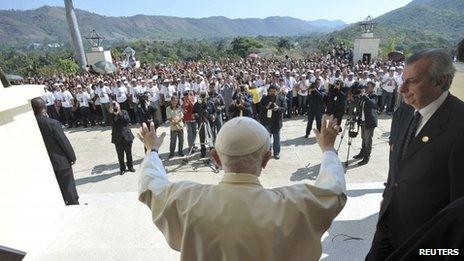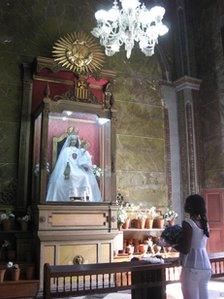Cuba's Catholic church still cautious as Pope arrives
- Published

Cuba is a communist state with a vast statue of Christ towering over it. The monument, above the bay in Havana, was completed just before the revolution and never removed. It has recently been restored by the state, the scaffolding dismantled just before the arrival of Pope Benedict.
But there have been difficult decades in Cuba for Catholics.

The days when Catholics were harassed have passed
The Church was never banned, but the island was officially atheist until 1992. Practising Catholics could not join the Communist Party.
"You had to be atheist to advance. If not, you were [thought] backwards, superstitious," remembers Gustavo Andujar, a devout Catholic.
"There was a time in the early 1960s when churches were harassed. Children would throw stones to harass people during mass. We Catholics suffered in those times but fortunately, they've long gone."
Cuba today is secular, the faithful are free to worship and the Catholic Church is busy reasserting itself.
'Here to help'
Charity work is a key part of that.
Every weekday in a poor, tumbledown neighbourhood of Old Havana, volunteers hand out big cups of milk and bread rolls to more than 40 school children.
The breakfast club is one of dozens of aid projects run by the Church, in a country where so much else is tightly controlled by the state.
"We're not trying to compete with the government," says Oscar Rodriguez, the volunteer in charge. "We're just here to help."
That stance has allowed the Church to reinsert itself, quietly, into society.
It is now running MBA courses inside the old Catholic seminary. Many of the students strolling the cloisters are state-employees, looking for skills to take up work in the growing private sector.
And, on the edge of the city, is the modern peach-pink seminary that replaced it.
Inaugurated in 2010, it is the first new church building permitted since the revolution when religious schools were taken over and many priests fled.
Fifty-two young men are now studying there for the priesthood, trying to cut their country's historic dependence on clergy from abroad.
"This is a country with 11 million people, and only about 350 priests," says seminary rector, Jose Miguel Martin - himself a Spaniard. "We need more."
When the seminary was inaugurated in 2010, President Raul Castro was at the ceremony. His presence was a powerful symbol of the improved relations between Catholic Church and Communist state.
But some argue the Church is not using its unique position and growing influence as it should.
While Cubans are now free to worship, they are still tightly controlled in other areas, such as the right to free assembly.
Dissidents demand more support
Before the Pope arrived, Amnesty International reported a sharp rise in the short-term detention of dissidents by police.
Cuba claims they are paid by the US to undermine the revolution.
The Amnesty report followed the round-up of dozens of activists from the Ladies in White, a group that marches in silence for human rights every Sunday in Havana.
"The Church has a social doctrine, which protects the marginalised and the suffering. But the cardinal stays silent against these abuses," complains Berta Soler, one of the group.
But Berta Soler's husband was one of 75 political prisoners released in 2010 after Cuba's Cardinal intervened with the authorities.
Church leaders point to that as an example of what can best be achieved through quiet diplomacy. After so long operating on the margins, they are wary of any direct challenge to the regime.
"We're not a political party," said Havana's Auxiliary Bishop, Alfredo Petit.
"The Church will not be a flag of justice. We are not here to defend human rights in the first place. Our role is to preach the gospel, that's clear."
The last time a Pope visited this island 14 years ago, many of its vast churches were almost empty. That has been changing slowly ever since.
The Church that Pope Benedict is visiting in Cuba is much stronger. But it is cautious, not entirely secure.
- Published19 March 2012